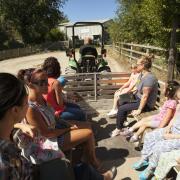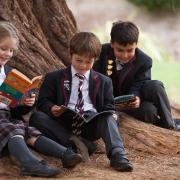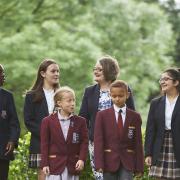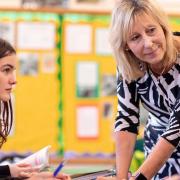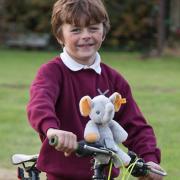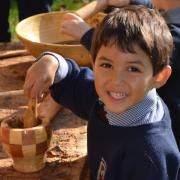How do books stand up in a child’s world dominated by so many influences and distractions? You can help by introducing your child to their local library and get their reading off to the right start.
The accusations flow thick and fast: children no longer read, they are too busy watching TV, playing games on their iPads, texting one another, checking Facebook.
A recent Knowthenet survey indicated that more than half the nation’s children have used a social network by the age of 10. Facebook continues to top the bill with many children ignoring the minimum age (13) requirement. WhatsApp is used by 40 per cent of eight to 16 year olds and BBM by 24 per cent – with other popular sites clocking up impressive usage.
Thus it isn’t surprising that a lot of the adult population perceive that books no longer play a big part in the lives of children and young people. But statistics don’t necessarily examine the other side of the picture.
Lindsay Prestage, Community Development Librarian for Maidstone District Library Services, presents a far more optimistic scenario.
She believes that, rather than discouraging reading: “Technology based formats such as texts, websites and social media can encourage reading and they require reading skills.
“Overall, levels of reading enjoyment and the amount of time spent reading each day are continuing to improve among children aged eight to 18.”
Few would argue that, despite cuts that affect every area of public services, Kent Libraries do a magnificent job. This is endorsed by the fact that they have held a Customer Service Excellence Award continuously since 2010 and before that, a Charter Mark since 1991.
As an indication of their worth, in the period 2013/14, Kent Libraries issued 5,670,770 items and added 256,247 items to their stock.
The young people’s sections are committed to encouraging readers of all ages. Lindsay says that many parents are very supportive and encourage children to join the library at an early age. She points out that children do not need to be able to read in order to become a member.
She suggests even the very youngest can be introduced to library activities such as Rhyme Time (under threes) and Story Time (three to four year olds) and says that early involvement lays the foundations for language development and encourages concentration and listening.
In fact, a practice that could last a lifetime may well start when parents take children to the library to borrow books as part of the family routine.
Kent Libraries offer schools the chance to visit their local library to find out what is on offer.
The sessions are tailored to suit the ages of the young visitors and a special ticket allows school staff to borrow up to 50 books at any one time and exchange the books whenever they like. The subscription service represents great value at just £100 per year.
Young members of any Kent library are allowed to borrow up to 30 items at a time – including DVDs (the latter according to age). Stock includes items suitable for very young children, picture books, beginner reads and short chapter books. Older children have access to books written especially for the teenage market.
Computers are free to use in all libraries (parental permission required by those under 16). The library services provided for children and young people are truly composite and library membership of under fours to teenagers in Kent records excellent numbers.
Maidstone’s central library has a total of 3,582 young members, Tonbridge 5,005, Larkfield 4,560, Hildenborough 717, Allington 1,027, Staplehurst 576, Coxheath 828 and Madgingford 895.
The majority of the libraries included in the interviews reported that most active borrowers are in the five to 11 age groups. Although the libraries don’t keep statistics on the numbers of young people who go on to become adult members, the indications are positive.
All Kent libraries offer a range of activities for children and young people. David Castle, speaking of the Allington branch, says that he finds a lot of parents introduce children to the library at a very young age, evidenced by the fact that the Baby Bounce and Rhyme (under three) sessions are very popular.
Rhyme Time is also offered at other libraries, including: Kent History and Library Centre, Coxheath, Marden, Staplehurst and Yalding.
Madginford Library offers Toddler Time and a Reading Group for 11 to 14 year olds. Several libraries have Story Time sessions (three to four year olds), Story Makers (four to six year olds) and Word Buddy Club (seven to 10 year olds).
Kent libraries support the Summer Reading Challenge, a national programme produced by The Reading Agency. Children aged between four and 12 are challenged to read six books during the school holiday and on completing the challenge win stickers, a certificate and a medal.
This year’s theme was Record Breakers and 15,650 children in Kent took part. Kent libraries also deliver the Bookstart programme which provides a free book pack for pre-school children, at the time of the birth-registration appointment and again at about age three.
Bookshine packs are available for deaf children, Booktouch for children who are registered blind and Bookstart Star for children whose disabilities affect their fine motor skills.
Members of staff are passionate about the services they provide and their desire to help readers of all ages make the best use of Kent’s 99 libraries. Alyn Thomas, Kent County Council’s business development manager for libraries, says: “KCC is committed to the future of our library service. The best way to preserve them as a vital part of communities across the county is to get children visiting them from an early age.’’
Libraries, Registration and Archives Area Manager Amanda Forrest says: “The library is a key part of many children’s lives as it offers a world of exploration and adventure all under one roof. It’s also a great way for them to develop, learn and let their imaginations run free. From babies to older teens, we cater for all ages – and it’s free.”
Jo Warwick, the manager of Hadlow Rural Community Pre-school (two to fives), adds: ‘‘We take the children to the library regularly. They look forward to going and love having stories read. The children’s confidence has grown and it is remarkable how quickly they learn to handle books carefully, in a very grown-up manner.’’
Parents are also full of praise. Sophie Pizzey says: “My son Ayrton asked if we could go to the library ‘because it’s very good to get books!’ Now we are regular visitors.”
Did you know?
• Currently the list of most popular books for children and young people includes: Hard Luck, by Jeff Kinney; Princess Mirror-Belle and the Dragon Pox, by Julia Donaldson; The Demon Dentist, by David Walliams.; Grandpa’s Great Escape, by David Williams; Little Stars, by Jacqueline Wilson; The Shepherd’s Crown, by Terry Pratchett; Diary of a Wimpy Kid, by Jeff Kinney; The Fault in our Stars, by John Green; Geek Girl – series, by Holly Smale.
• 33 libraries already provide free WiFi; with the help of a grant from the Department for Culture, Media & Sport, the remaining 66 will all be WiFi-enabled from April 2016.
• The Summer Reading Challenge is offered, with great success, at every one of Kent’s 99 libraries.
• “Taking a child to the library is the single most important thing parents can do to give their child a good start in life” (Professor Cathy Silver).
Find out more
Programmes are subject to changes and it is advisable to check timetables and obtain fuller information: www.kent.gov.uk/libs. w




